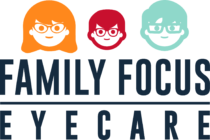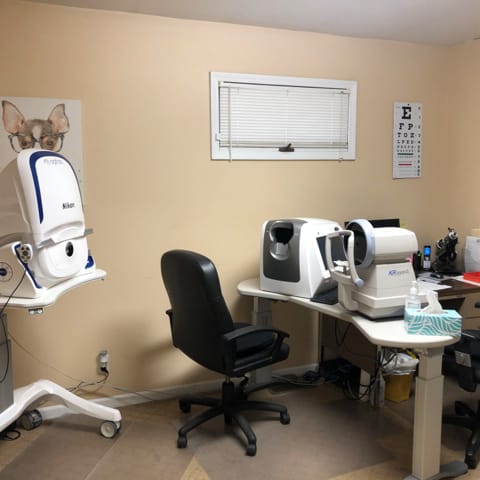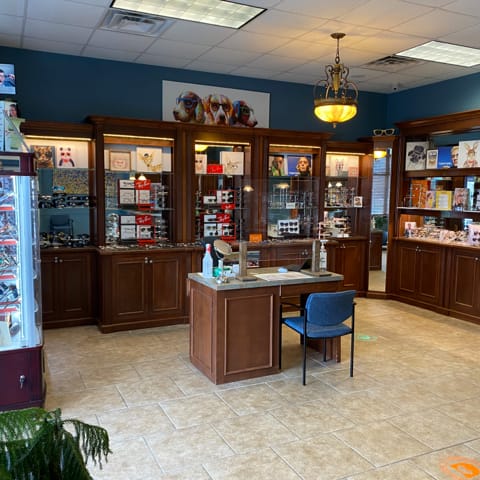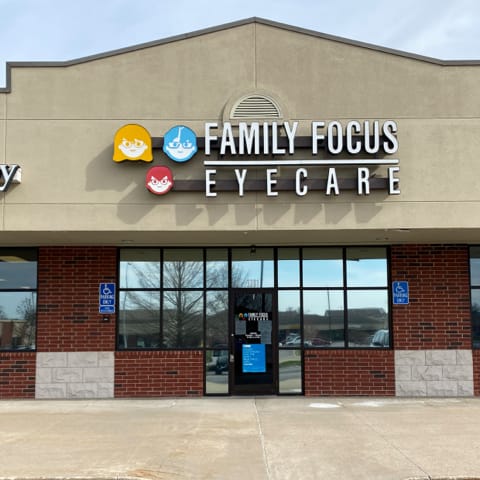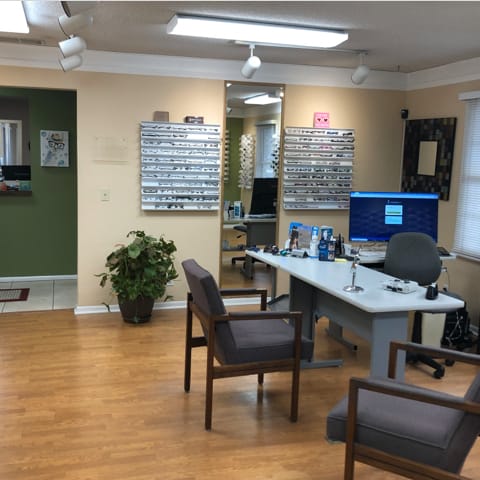Avoid the Silent Thief of Sight
Glaucoma is a serious condition. It’s often called “the silent thief of sight” because it can develop painlessly and with no symptoms, so it often goes unnoticed until devastating vision loss occurs.
The condition impacts 60 million people worldwide, making it the second leading cause of blindness. But, there’s good news. If it’s detected early, vision loss from glaucoma can often be prevented.
Our office has invested in advanced technology to test for glaucoma, helping you avoid a meeting with the Silent Thief of Sight. So please book your appointment with Family Focus Eyecare today.

What Is Glaucoma?
Glaucoma is a group of eye diseases characterized by damage to the optic nerve. This damage is often caused by high intraocular pressure, which compresses the optic nerve and causes cells to die. Often, this pressure increase is caused by fluid buildup in the eye.
The optic nerve is essential for sight. It transfers information from the retina to the brain. It’s the vital pathway between your eyes and your brain.
Types of Glaucoma
Open-Angle Glaucoma
Open-angle glaucoma is the most common type of glaucoma. There are typically no warning signs or symptoms, and the disease develops without pain. Peripheral vision is often the first thing to deteriorate, so it can go unnoticed by people who do not have regular eye exams.
Open-angle glaucoma happens when the eye’s drainage channels become blocked over time. This causes fluid buildup and a rise in intraocular pressure. It can also be caused by an increase in fluid production.
Angle-Closure Glaucoma
When the cornea and iris move closer together and block the eye’s drainage channels, the result is angle-closure glaucoma. Those with smaller-than-average drainage angles are at an increased risk of developing this type of glaucoma.
Chronic angle-closure glaucoma occurs over time, while acute angle-closure glaucoma happens suddenly. Acute angle-closure glaucoma is a medical emergency.
If you experience the following symptoms, you may be having an acute angle-closure glaucoma attack:
- Eye pain
- Halos
- Headache
- Sudden blurry vision
- Nausea
Normal Tension Glaucoma
Damage to the optic nerve can occur even without increased intraocular pressure. When this happens, it’s known as normal tension glaucoma. The causes of normal tension glaucoma are unknown, but it could be caused by an overly sensitive optic nerve.
Secondary Glaucoma
High intraocular pressure caused by trauma, previous surgery, or medication can lead to secondary glaucoma.
Glaucoma Risk Factors
Glaucoma can cause irreversible vision loss before any symptoms are noticeable. Knowing these risk factors can give you a starting point to discuss glaucoma with your optometrist:
- Family history of glaucoma
- Diabetes
- Heart disease
- High blood pressure
- Progressive refractive errors
- Previous eye trauma
- Corticosteroid medications
- High internal eye pressure
- Over 60
Treating Glaucoma
While vision loss from glaucoma can’t be reversed, glaucoma treatment can slow the progression of the disease and prevent blindness. Treatments often focus on lowering eye pressure to avoid damage to the optic nerve.
There are 2 main ways to reduce this pressure.
The first is through prescription eye drops. Medication can either improve how fluid drains from the eye or decrease the volume of fluid produced altogether.
Various types of surgery are the second option:
- Laser Surgery: Used for open-angle glaucoma, laser surgery can allow for better fluid flow out of the eye.
- Filtering Surgery: An opening is created in the sclera, and the trabecular meshwork is completely removed.
- Drainage Implant Surgery: Small tubes are inserted to help drain fluid away from the optic nerve.
Regular Eye Exams Are the Best Prevention
At Family Focus Eyecare, we’re well-equipped to detect and diagnose glaucoma. Please book an appointment for a comprehensive eye exam today.
Visit One of Our Locations
Columbia
We are in Westbury-1.5 miles further west from our old W. Broadway location, near Toasty Goat and the new Club Carwash
- 725 S. Scott Blvd Suite 101
- Columbia, MO 65203
Our Hours
- Monday: 9:00 AM – 5:00 PM
- Tuesday: 9:00 AM – 5:00 PM
- Wednesday: 9:00 AM – 5:00 PM
- Thursday: 9:00 AM – 5:00 PM
- Friday: 9:00 AM – 5:00 PM
- Saturday: By Appointment
- Sunday: By Appointment
Eldon
Our Eldon location is on Oak Street, two blocks north of the post office and between North and High Street.
- 115 N Oak St
- Eldon, MO 65026
Our Hours
- Monday: 8:30 AM – 5:00 PM
- Tuesday: 8:30 AM – 5:00 PM
- Wednesday: 8:30 AM – 5:00 PM
- Thursday: 8:30 AM – 5:00 PM
- Friday: 8:30 AM – 5:00 PM
- Saturday: By Appointment
- Sunday: By Appointment
Our Brands
View All Brands



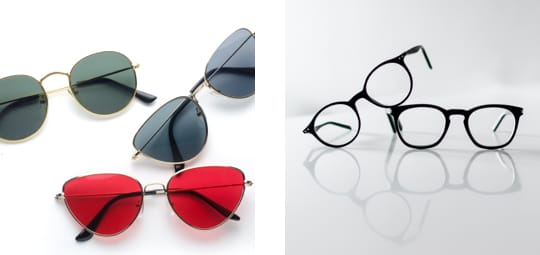

Our Testimonials
Dr. Rich is extremely helpful and thoughtful. He cleared up my eye issues within one appointment and even allowed for texts to assess after the appointment. I had been going to a specialist in Columbia for a year and they didn’t even compare to how great Family Focus Eyecare was!
Erin Scrivner
Dr. Barrett is knowledgeable, friendly and practical, I have gone to her for years and trust her. The office staff is great, they are willing to help and make appointments when you need care quickly.
Pamela Didur
The Family Focus Eyecare team is amazing! They really make you feel like home the second you walk through the door. My husband and I both have been very pleased and highly recommend them to anyone in the Columbia area!
Katie Beasley
Twice now, the staff at FFEC have gone above and beyond to help me see clearly. One time I had a contact lens come out while I was driving. It gave me a migrane, and I drove around in desperation trying to find an eye exam since my prescription was expired…. After being turned away in an EMPTY waiting room at the WalMart vision center, and not even being offered a sample pair till an an appointment could be set… I called FFEC and they not only had me come right over, they squeezed me in between two clients, gave me replacement contacts, and informed me my insurance would cover everything because they looked up my plan details for me!! (I didnt even know I had vision coverage). What an exceptional team and business!!!! I was so thankful. This might be the first review I have ever taken the time to write.
Dorian Brownlee
I had a great experience!! Very knowledgeable staff and excited about the new contact lens options! Highly recommend!
Rhonda Bledsoe
Dr. Rich was so great with our 3 year old son! He was patient and sweet. This was during COVID and they were very careful with masks and cleaning. I plan to go back myself and so does my husband.
Amanda Fisher
I had an acute eye problem and FFE was able to get me in within a few days where other places were months out. They diagnosed the problem quickly and I was on my way feeling relieved that I would soon be headache free.
Kasie Sly
The entire team was friendly, efficient and helpful throughout my entire experience. Best customer service experience I’ve had with an eye doctor in Columbia. I would highly recommend them to anyone.
Sarah Carnes
Best of the best! Very quick and courteous. No wasted time and the prices seem very fair for the services rendered. One of my biggest concerns was picking frames and they made it painless. Very pleased, I recommend them without hesitation!
Steve Baumann
Dr. Rich is by far the best eye doctor I have ever met! They went above and beyond to help me find the right pair of frames for me. I get compliments every time I wear them. No matter where I live I will always see Dr Rich for my eye care. I moved to STL and I still make the 2 hour drive to meet with him – totally worth it.
Walter Juarez
Dr. Rich is fantastic! My last eye exam has been years ago and this is my first visit at Family Focus Eyecare. I was immediately impressed with the attentive staff as you walk in, not only were the friendly but also extremely efficient getting me started and keeping me on time. The lobby area is pleasant and has a nice new feel to it. Because this was my first visit I had to go through the typical tests for them to examine my eyes and their technology & equipment are top-notch, it was so easy. Once I met with Dr. Rich he explained everything clearly and especially took the time to ask me many questions about my eyes, habits, difficulties and things I felt needed his attention. After consulting with him thoroughly and running numerous tests I was given a LOWER prescription! He was able to determine my contacts were too strong and what was causing my vision to not be perfect. Everything about my experience was perfect and I highly recommend Dr. Rich and Family Focus Eyecare!
John Sorensen
The staff is so friendly, helpful and very accommodating for kids. My girls are sad that they only get to go once a year.
Joy Lowe

Our Google Reviews

Our Blog
Does Castor Oil Remove Age Spots?
Dry EyeIPLCastor oil can help lighten age spots, but it’s not the most effective. Learn how IPL therapy can effectively remove age spots with Family Focus Eyecare. […]
Does Screen Time Cause Myopia?
Eye careMyopiaA child with large round glasses sitting on a couch and holding a smartphone very close to his face
[…]
Is Hyaluronic Acid Good for Rosacea?
AestheticsDermatologists often recommend HA to treat rosacea because it can provide moisture for parched skin and, when used as part of a customized skincare routine, may improve your complexion. […]
Does Castor Oil Remove Age Spots?

Castor oil can help lighten age spots, but it’s not the most effective. Learn how IPL therapy can effectively remove age spots with Family Focus Eyecare. […]
Does Screen Time Cause Myopia?

A child with large round glasses sitting on a couch and holding a smartphone very close to his face
[…]
Is Hyaluronic Acid Good for Rosacea?

Dermatologists often recommend HA to treat rosacea because it can provide moisture for parched skin and, when used as part of a customized skincare routine, may improve your complexion. […]
